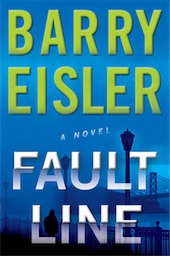Barry Eisler started his professional life as a covert operations agent for the CIA, transformed himself into a Silicon Valley intellectual property lawyer and entrepreneur. He’s now best-known for his espionage thrillers. This month Sony Pictures plans to release the first action film derived from an Eisler novel, Rain Fall. His latest book launches a new genre: the blogosphere thriller. I put six questions to Barry Eisler about his latest novel, Fault Line.
1. Your latest novel turns on a special access program run out of JSOC, the military’s Joint Special Operations Command, that involves targeted killings—what might in blunter language be called assassinations–both overseas and within the United States. The novel appeared just as Sy Hersh gave a talk claiming that the Bush Administration operated a targeted killings program. Hersh states flatly that Vice President Dick Cheney ran this program out of the White House. Surely you don’t mean to imply that you think there’s any basis in fact for all this left-wing hysteria?

Ah, those left-wing hysterics, with their shrill, paranoid theories about torture and black sites and warrantless eavesdropping. The next thing you know, they’ll be claiming the Bush administration issued secret memos preparing to suspend the First and Fourth Amendments during domestic military operations or something like that. How do they dream up such nonsense?
I got the idea for the novel’s special access program after reading an article in the New York Times on a unit of covert soldiers known as “Military Liaison Elements,” which touched on certain programs I knew about from my time with the CIA. So I knew I was writing something not just realistic, but potentially real–which is always my goal. But I didn’t know just how real until I read the article about Hersh’s speech. When it comes to thriller-level conspiracies, skullduggery, and corruption, the Bush administration really was life imitating–if not exceeding–art.
2. You’ve got two protagonists—brothers named Alex and Ben, one a Silicon Valley lawyer and the other a black ops assassin. But they look suspiciously like two chapters from your life. Are these figures autobiographical?
They certainly draw on two disparate positions I’ve held: the first, as a covert employee of the CIA; the second, as a Silicon Valley technology lawyer and startup executive. It was a pleasure to draw on my experience in both the secret world and the law to craft the characters in Fault Line and create their milieus. But my own experience was only the beginning for these characters, not the end.
“What, you don’t think the NSA would kill people? And I’m the one living in a bubble? I bet you don’t think the president would arrest an American citizen on American soil and hold him without granting him access to an attorney or charging him with a crime or otherwise adhering to constitutional requirements. I bet you don’t think the government would wiretap Americans without a warrant, either. I bet you don’t think—”
“You don’t know the first fucking thing about what I think.”
“—that the government would cook up intelligence to start a war. I bet you don’t think the government is run by people who’ve gotten as far as they have in politics by learning to rationalize all kinds of corruption, in the name of the greater good. Are you telling me these things don’t go on, every single day?”
—From Fault Line
Reprinted by permission of the publisher, Ballantine Books. Copyright (c) 2009 Barry Eisler
3. You use Alex and Ben as a foil for some interesting discussions of the ethics and legality of a number of government programs from the Bush era—the “highly coercive interrogations” program, extraordinary renditions, and the NSA’s sweeping domestic surveillance program, for instance. Tell us where Barry Eisler stands on the use of torture techniques like waterboarding and extreme isolation—is he with Jack Bauer or with Matthew Alexander?
Well, if the goal is to make entertaining television, the Jack Bauer approach is certainly suitable. And torture is also an excellent way to get the subject to confess to anything at all, which is why it was a wonderful tool for the Spanish Inquisition and for the secret police of assorted totalitarian regimes. But if the goal is to produce accurate, actionable intelligence, torture is madness, as Alexander argues in his book, How to Break a Terrorist: The U.S. Interrogators Who Used Brains, Not Brutality, to Take Down the Deadliest Man in Iraq. To paraphrase Oscar Wilde, torture is worse than immoral: it’s tactically stupid. It produces false confessions, which can be used to confirm mistaken suspicions and even outright policy fantasies; it instills an insatiable thirst for vengeance in most people who are subjected to it, and so creates new, dedicated enemies; it permanently brutalizes its practitioners; and it cuts us off from intelligence from the local populace because so many people will refuse to inform on someone if they fear he’ll be tortured.
But when someone hurts you, the immediate, innate human reflex is to hurt back. We were too powerless to prevent the original hurt–in this case, 9/11–but if we can hurt the offending party back, we reassure ourselves that we’re not as powerless as we initially feared. This dynamic is the basis for the urge for vengeance, and the urge for vengeance can be so strong that it can be partly satisfied even by proxy–say, by attacking a country that had nothing to do with 9/11, or by torturing people against whom we have no reliable evidence but who look like or otherwise remind us of the people behind 9/11.Of course, the satisfaction of atavistic emotional impulses shouldn’t be the goal of policy. “If it feels good, do it” used to be a phrase associated with the left. We live in strange times.
4. The names in your novel read like a roll-call of the civil-liberties blogosphere—you have Hilzoy (Hilary Bok), Andrew Sullivan, Glenn Greenwald, and Josh Marshall worked in. And the man running the black ops killing program is named Scott Horton. Ahem. But I was also taken by the fact that characters in Fault Line turn continually to the blogs—not to newspapers, radio or television—for their information, and in the end of the book, for solutions to their dilemma. Would it be fair to call this a blogosphere thriller?
More than fair. It was a pleasure for me to name so many characters after bloggers I admire, and to make blogs key to the characters’ hopes for defeating the conspiracy plotting to kill them. In making bloggers and blogs central, and, by implication, making the mainstream media moribund and irrelevant, I think Fault Line reflects reality–while, I hope, nudging reality along.
Discussions of the rise of the blogosphere and the decline of the “Mainstream Media” tend to center on the logistics of shipping paper or the expense of broadcast and other such costs of traditional media. And while these are all relevant factors, how often does the MSM consider whether part of their business woes might be a reflection of the quality of the underlying product? Is it possible the blogosphere’s growth is attributable at least in part to a growing sense among the public that by and large, the MSM acts either as a government press organ or as a gossip rag?
“Let’s make sure Iran is on the list. After all, every country with a GDP the size of Finland’s is a grave threat to our national security. I mean, did you see it on the news? Two Iranian nuclear scientists were assassinated last week in Istanbul.”
“Really?” Ben said. “I must have missed it.”
“Yes, and their bodyguards, too. Even though we have a law—Executive Order 12333—that prohibits assassination.” Ben shrugged. “What can you do? Iran has a lot of enemies.”
“Sure, and maybe we subcontracted the job to one of them, just like we used to subcontract torture to get around our laws against that. Until we started doing it ourselves. You see what happens when it’s okay to break the law a little? It starts getting broken a lot.”
—From Fault Line
Reprinted by permission of the publisher, Ballantine Books. Copyright (c) 2009 Barry Eisler
5. The national security “threat” that provides the backdrop for the novel involves the development of software for viral cryptography. Explain how you came by cyberwarfare as a topic and why you chose it notwithstanding the fact that it makes for a much more complicated plot development.

Well, without giving away too much of the story, I’ll just say I was looking for something that might seem benign on the surface, but that could also have tremendous weapons potential were it to fall into the wrong hands. Something that would be attractive to a number of players, government and non-state, if they were aware of its true nature. I read an article in The Economist about malicious cryptology–the practice of using security protocols not to protect against viruses, but to disguise viruses and make them undetectable by traditional security software. I started wondering about how a viral program might be disguised, how it would be used, who would want it and why. Which led me to Adam Young’s and Moti Yung’s excellent book, Malicious Cryptology: Exposing Cryptovirology. After which it was my pleasure to run some ideas past a number of computer security experts. And who knows? Maybe we’ll learn about a program just like it soon enough from Seymour Hersh…
6. One of the key characters in your novel is a young Iranian-American lawyer named Sarah. You give an interesting profile of her problems coping with the suspicions that young Iranian-Americans face, and I notice in passing you refer to the case of Alex Latifi, a brilliant Iranian-American engineer who endured years of vicious persecution from abusive federal prosecutors in Alabama before finally being vindicated in court. Did the Latifi case provide you with inspiration for the development of Sarah as a character?
It did, and I first read about it here. It’s strange, I attend several mystery and thriller conventions every year, and often there’s a panel discussion on whether the thriller can survive the end of the cold war, or, more recently, whether thrillers can survive the end of the Bush Administration. To which my response is: are you kidding? If you pay attention, there’s more inspiration for thrillers in today’s news than any writer could handle in a lifetime.



